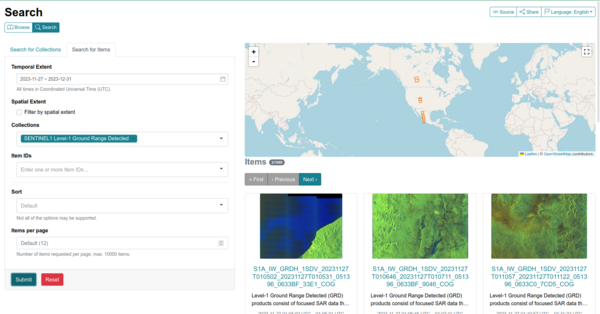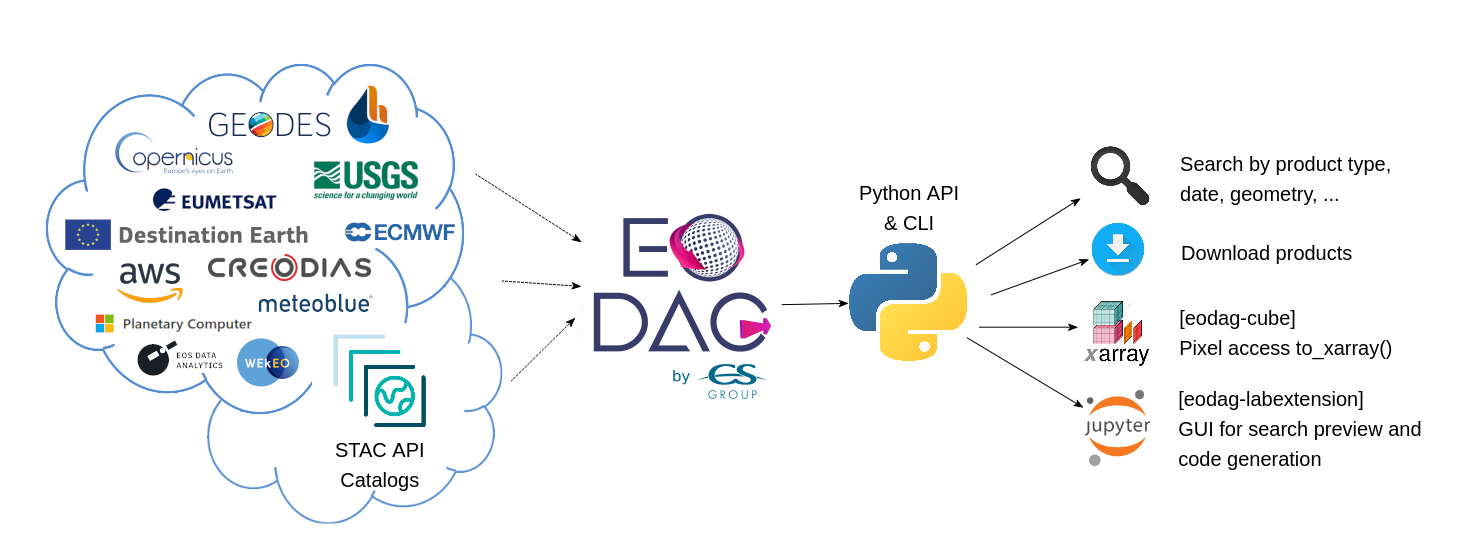



EODAG (Earth Observation Data Access Gateway) is a command line tool and a plugin-oriented Python framework for searching, aggregating results and downloading remote sensed images while offering a unified API for data access regardless of the data provider. The EODAG SDK is structured around three functions:
- List product types: list of supported products and their description
- Search products (by product type or uid) : searches products according to the search criteria provided
- Download products : download product “as is"
EODAG is developed in Python. It is structured according to a modular plugin architecture, easily extensible and able to integrate new data providers. Three types of plugins compose the tool:
- Catalog search plugins, responsible for searching data (OpenSearch, CSW, ...), building paths, retrieving quicklook, combining results
- Download plugins, allowing to download and retrieve data locally (via FTP, HTTP, ..), always with the same directory organization
- Authentication plugins, which are used to authenticate the user on the external services used (JSON Token, Basic Auth, OAUTH, ...).
Since v2.0 EODAG can be run as STAC client or server.
Read the documentation for more insights.
EODAG is on PyPI:
python -m pip install eodagFor downloading you will need to fill your credentials for the desired providers in your eodag user configuration file. The file will automatically be created with empty values on the first run.
Example usage for interacting with the api in your Python code:
from eodag import EODataAccessGateway
dag = EODataAccessGateway()
product_type = 'S2_MSI_L1C'
footprint = {'lonmin': 1, 'latmin': 43.5, 'lonmax': 2, 'latmax': 44}
start, end = '2021-01-01', '2021-01-15'
search_results, found_nb = dag.search(productType=product_type, geom=footprint, start=start, end=end)
product_paths = dag.download_all(search_results)
for path in product_paths:
print('Downloaded : {}'.format(path))An eodag installation can be exposed through a STAC compliant REST api from the command line:
$ eodag serve-rest --help
Usage: eodag serve-rest [OPTIONS]
Start eodag HTTP server
Options:
-f, --config PATH File path to the user configuration file with its
credentials
-d, --daemon TEXT run in daemon mode
-w, --world run flask using IPv4 0.0.0.0 (all network interfaces),
otherwise bind to 127.0.0.1 (localhost). This maybe
necessary in systems that only run Flask [default:
False]
-p, --port INTEGER The port on which to listen [default: 5000]
--debug Run in debug mode (for development purpose) [default:
False]
--help Show this message and exit.
# run server
$ eodag serve-rest
# list available product types for ``peps`` provider:
$ curl "http://127.0.0.1:5000/collections?provider=peps" | jq ".collections[].id"
"S1_SAR_GRD"
"S1_SAR_OCN"
"S1_SAR_SLC"
"S2_MSI_L1C"
"S2_MSI_L2A"
"S3_EFR"
"S3_ERR"
"S3_LAN"
"S3_OLCI_L2LFR"
"S3_OLCI_L2LRR"
"S3_SLSTR_L1RBT"
"S3_SLSTR_L2LST"
# search for items
$ curl "http://127.0.0.1:5000/search?collections=S2_MSI_L1C&bbox=0,43,1,44&datetime=2018-01-20/2018-01-25" \
| jq ".context.matched"
6
# browse for items
$ curl "http://127.0.0.1:5000/S2_MSI_L1C/country/FRA/year/2021/month/01/day/25/cloud_cover/10/items" \
| jq ".context.matched"
9
# get download link
$ curl "http://127.0.0.1:5000/S2_MSI_L1C/country/FRA/year/2021/month/01/day/25/cloud_cover/10/items" \
| jq ".features[0].assets.downloadLink.href"
"http://127.0.0.1:5000/S2_MSI_L1C/country/FRA/year/2021/month/01/day/25/cloud_cover/10/items/S2A_MSIL1C_20210125T105331_N0209_R051_T31UCR_20210125T130733/download"
# download
$ wget "http://127.0.0.1:5000/S2_MSI_L1C/country/FRA/year/2021/month/01/day/25/cloud_cover/10/items/S2A_MSIL1C_20210125T105331_N0209_R051_T31UCR_20210125T130733/download"You can also browse over your STAC API server using STAC Browser
with CATALOG_URL=http://127.0.0.1:5000 :

For more information, see STAC REST interface usage.
Create a configuration file from the template user_conf_template.yml provided with the repository, filling in your credentials as expected by each provider (note that this configuration file is required by now. However, this will change in the future).
Then you can start playing with it:
To search for products and crunch the results of the search:
eodag search \ --conf my_conf.yml \ --box 1 43 2 44 \ --start 2018-01-01 \ --end 2018-01-31 \ --cloudCover 20 \ --productType S2_MSI_L1C --cruncher FilterLatestIntersect \ --storage my_search.geojson
The request above search for product types S2_MSI_L1C and will crunch the result using cruncher FilterLatestIntersect and storing the overall result to my_search.geojson.
You can pass arguments to a cruncher on the command line by doing this (example with using FilterOverlap cruncher which takes minimum_overlap as argument):
eodag search -f my_conf.yml -b 1 43 2 44 -s 2018-01-01 -e 2018-01-31 -p S2_MSI_L1C \
--cruncher FilterOverlap \
--cruncher-args FilterOverlap minimum_overlap 10
The request above means : "Give me all the products of type S2_MSI_L1C, use FilterOverlap to keep only those products that are contained in the bbox I gave you, or whom spatial extent overlaps at least 10% (minimum_overlap) of the surface of this bbox"
To download the result of a previous call to search:
eodag download --conf my_conf.yml --search-results my_search.geojson
To list all available product types and supported providers:
eodag list
To list available product types on a specified supported provider:
eodag list -p sobloo
To see all the available options and commands:
eodag --help
To print log messages, add -v to eodag master command. e.g. eodag -v list. The more v given (up to 3), the more verbose the tool is. For a full verbose output, do for example:
eodag -vvv list
If you intend to contribute to eodag source code:
git clone https://github.com/CS-SI/eodag.git cd eodag python -m pip install -r requirements-dev.txt pre-commit install
To run the default test suite (which excludes end-to-end tests):
tox
To only run end-to-end test:
tox -- tests.test_end_to_end
To run the entire tests (units, integration and end-to-end):
tox -- tests eodag
Note
- Running the tox command will also build the docs. As The documentation includes some notebooks (for the turorials), the build process will need pandoc to succeed. If the build process fails for you, please install pandoc and try again.
- When contributing to tutorials, you will need to keep notebook outputs and save widget state. Otherwise outputs will not be visible in documentation.
- eodag is tested against python versions 3.6, 3.7, 3.8 and 3.9. Ensure you have these versions installed before you run tox. You can use pyenv to manage many different versions of python
Releases are made by tagging a commit on the master branch. To make a new release,
- Ensure you correctly updated README.rst and CHANGES.rst (and occasionally, also NOTICE - in case a new dependency is added).
- Check that the version string in eodag/__meta__.py (the variable __version__) is correctly updated
- Push your local master branch to remote.
- Tag the commit that represents the state of the release with a message. For example, for version 1.0, do this: git tag -a v1.0 -m 'version 1.0'
- Push the tags to github: git push --tags.
The documentation is managed by a webhook, and the latest documentation on readthedocs follows the documentation present in master. Therefore, there is nothing to do apart from updating the master branch to publish the latest documentation.
EODAG is licensed under Apache License v2.0. See LICENSE file for details.
EODAG is developed by CS GROUP - France.
EODAG is built on top of amazingly useful open source projects. See NOTICE file for details about those projects and their licenses. Thank you to all the authors of these projects !
